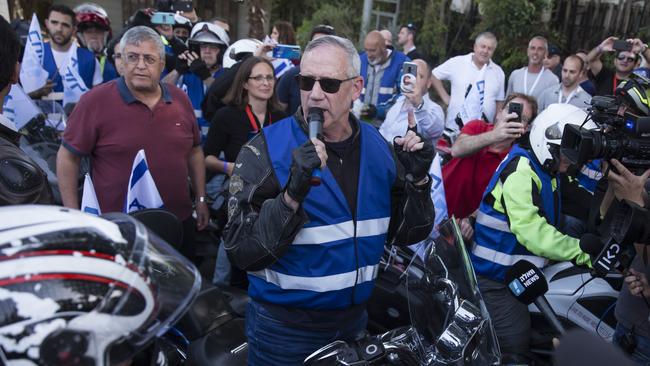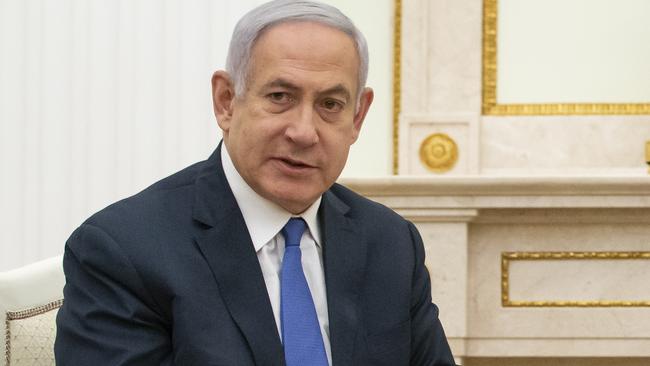All the tough guys want to be like Netanyahu
The Israeli PM’s staying power is the envy of populist leaders but he is no tinpot autocrat.

Roaring, cynical populists Viktor Orban, Recep Tayyip Erdogan, Vladimir Putin and Benjamin Netanyahu have succeeded in defining much of today’s noisy debate about how the world should be governed.
Their boast is that by converting marginalised protest voters into solid constituencies they have stayed in the saddle for decades. Pay attention to our triumphalist rants, they tell us. We have found the formula for branding nationalist policies as a rational response to the problems of our times. If you can’t deal with our towering vanity, move out of our way.
Populist regimes admire the staying power of “Bibi” Netanyahu, who faces perhaps the most crucial election of his career today, for his fifth term in office. The Russian President envies the Israeli army’s ability to operate under the radar. The Turkish leader is a fan of Israel’s start-up economy, its military-technology complex. The Hungarian Prime Minister stands in awe of the way a small country can leverage its influence with the US.
He answers the populist dilemma: how should leaders project the power of a nation-state and bend in their favour the supposed rules of the global order?

But while the rest of the Hellfire Club may see Netanyahu as the godfather of ethno-nationalism, he is no tinpot autocrat. Israel faces an existential, not an imaginary, threat. Putin plays into some kind of retrofitted imperialist instinct by marching into Ukraine but Netanyahu has real enemies. Iran is turning Hezbollah into a proxy army at astonishing speed. It gets $US700 million ($984m) a year from Tehran, boasts an arsenal of 150,000 rockets and missiles, and has set up an elaborate web of middlemen to supply weaponry. This could soon be the spearhead of the next war against Israel.
And despite Netanyahu’s demagogy, he is constrained by a democratic framework far older than those that flowered (and are now partly wilted) in the post-communist, post-junta Europe of the 1990s. It is difficult to imagine a public prosecutor opening a fraud and bribery case against the Russian or Turkish presidents, as the Israeli authorities have done against Netanyahu.
Israel has already jailed one former prime minister for corruption and a president on rape charges; the courts are serious and independent, the press gleefully disruptive. The country’s well-tested democratic institutions are a standout not just in the Middle East but in the whole proud-to-be-illiberal netherworld.
There is thus nothing straightforward about the latest electoral challenge to Netanyahu by former Israeli army commander Benny Gantz. Bibi is tired and unpopular but has boosted by US President Donald Trump’s decision to recognise Israeli sovereignty over the Golan Heights. Trump also backed moving his country’s embassy to Jerusalem. And he quit the international deal curbing Iran’s nuclear program.
Critics say handing the Golan to Israel will tempt Netanyahu to outflank his rival by moving in on other occupied territory. Will the axis between Trump and Bibi provide a licence to make war for domestic political gain?
That misreads Netanyahu. Tensions around a Hamas-orchestrated clash on the Gaza wall were quickly calmed with the help of Egyptian mediation. Netanyahu may bluster but he is a cautious war leader. He lends the lie to the thesis that populists are crazy risk-takers who drag nations into needless confrontation.
More often than not they listen carefully to the doubts of the domestic audience. In a country full of trained soldiers, short wars trump long wars. Raids on Hezbollah arms factories in Syria trump even short wars. And a Netanyahu who talks up war and then talks it down again wins points for statesmanship, at least in the White House.
This is not a page from the populist playbook but from Netanyahu’s biography. He and his elder brother Yoni were in the Matkal special forces. Both saw action. Bibi helped to free a hijacked Sabena airlines plane at Tel Aviv airport in 1972 and was wounded in the arm. Four years later Yoni was killed while freeing airline hostages in Entebbe. That has probably conditioned Netanyahu’s approach to war: demanding that generals spell out the risk to Israeli troops before authorising military action.
Those who despise populist movements are counting on Bibi losing. They underestimate him. There’s the backing from Trump, the quiet support of many Gulf states as they bond in shared distrust of a resurgent Iran. Plenty of populists assure him that he encapsulates the zeitgeist. And there’s his own skill at moulding coalitions with the ultra Right.
He should not squander his political capital by running away with ethno-nationalist blather. Israel’s strength remains that of its democratic institutions and its open, civilised discourse. Compromise that and Bibi will end up flat on his face.
The Times



To join the conversation, please log in. Don't have an account? Register
Join the conversation, you are commenting as Logout